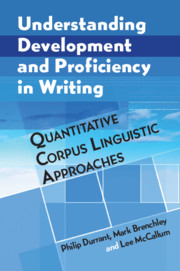Book contents
- Understanding Development and Proficiency in Writing
- Understanding Development and Proficiency in Writing
- Copyright page
- Contents
- Figures
- Tables
- Acknowledgements
- 1 Introduction
- 2 Theoretical and Methodological Foundations
- 3 Development in Syntax
- 4 Development in Vocabulary
- 5 Development in Formulaic Language
- 6 Development in Cohesion
- 7 Conclusions
- References
- Index
4 - Development in Vocabulary
Published online by Cambridge University Press: 26 February 2021
- Understanding Development and Proficiency in Writing
- Understanding Development and Proficiency in Writing
- Copyright page
- Contents
- Figures
- Tables
- Acknowledgements
- 1 Introduction
- 2 Theoretical and Methodological Foundations
- 3 Development in Syntax
- 4 Development in Vocabulary
- 5 Development in Formulaic Language
- 6 Development in Cohesion
- 7 Conclusions
- References
- Index
Summary
This chapter reviews the quantitative corpus linguistic literature on vocabulary development in first- and second-language writing. It first provides a theoretical and methodological context for such work by discussing the construct of vocabulary proficiency. It then critically reviews an extensive body of literature to establish what substantive conclusions can be drawn and what might constitute productive foci for future research. The strongest developmental patterns are found for measures of vocabulary diversity and use of academic vocabulary. There are also important, but complex, developmental patterns with regard to use of high- versus low-frequency words. However, the current range of measures attested in the literature has significant limitations: they are limited in scope, focusing almost exclusively on breadth, rather than depth, of vocabulary knowledge; relationships between measures and knowledge constructs is often unclear; the relationships between measures themselves, which often overlap with each other in complex ways, are largely unexamined; measures are often too coarse-grained, and may consequently disguise important developmental patterns by conflating distinct constructs.
Keywords
- Type
- Chapter
- Information
- Understanding Development and Proficiency in WritingQuantitative Corpus Linguistic Approaches, pp. 117 - 146Publisher: Cambridge University PressPrint publication year: 2021



